- Before Odumodu broke onto the scene, there were talented and brilliant artists whose music not only had a profound and positive far-reaching effect on the industry but also shaped the socio-cultural outlook of Nigerian societies. Their lyrics became street anthems, their ad-libs became salutations and slang, and their intro became byword and metaphor for attention and call of duty.
Popular Nigerian artist, Tochukwu Gbubemi Ojogwu, better known as Odumodu, is a man of many forms. Even though their profession puts them in line of public scrutiny, only a few artists in Nigeria have a proclivity for courting controversy and revelling in the attention that social media trends bring, like Odumodu. His polemical disposition and eccentricity always put him on a collision course with not just cranky netizens but also his colleagues in the music industry.
He has haters and admirers in balanced proportion. He is respected and loved in equal measure. You have on the one hand a deluge of disagreeable personalities who find his music disdainfully pedestrian and viscerally repulsive and then you’ve on the other hand those who find the perfect blend of his unique voice and his eponymous style of rap splendid and enjoyable. If he is not entangled in a bicker with the first set of people then he can be seen engaging in a feisty and disconcerting battle of wits and nerves with his fellow rappers as seen a few days ago during his menacing public spat with Blaqbonez
Odumodu in the eye of the storm again
In a deft move to cement his place in the pantheon of Nigeria’s music industry’s greatest artists, Odumodu, during an interview, made a bold claim that “No Nigerian hip-hop song has had the cultural impact that ‘Declan Rice’ has in the past twenty years.”


Odumodu’s claim was not unconnected to his recent feisty beef with Blaqbonez who took a swipe at the former in a single titled “Who’s Really Rapping”. A bold, no-holds-barred track by rap veteran A-Q, featuring Blaqbonez.
Analysing Odumodu’s chest-thumping and triumphant assertion.
What is cultural impact?
Cultural impact in music refers to the influence a song has on shaping a societal behaviour, values, and way of life.
How does Declan Rice stack up against popular rap and hip-hop hits of the past decades
Before Odumodu broke onto the scene, there were talented and brilliant artists whose music not only had a profound and positive far-reaching effect on the industry but also shaped the socio-cultural outlook of Nigerian societies. Their lyrics became street anthems, their ad-libs became salutations and slang, and their intro became byword and metaphor for attention and call of duty. The titles of their songs were printed on T-shirts by shrewd business owners who leveraged the cultural impact of their songs for profitability.
A look at the songs that took Nigeria by storm
Oleku (Ice Prince ft Brymo)
Released in 2010, Oleku not only became an instant hit, but it also catapulted Ice Prince and Brymo to the mainstream of the highly competitive music industry at the time. Released when digital music streaming was still at its inchoate stage and not available in Nigeria, Oleku received massive airplay and broke every Nigerian music chart at the time. It won a BET award.
So widespread is the impact of the song that a shout from you would see a total stranger reply with ‘tell me something wey I fit do”
Pon Pon Pon (Dagrin)
Pon Pon Pon is one of the tracks from Dagrin’s sophomore album, CEO. The combination of his rapping prowess and the melodious use of Yoruba made the album a massive success. The title of the track and its chorus became street lingo.
Alobam ( Phyno)
The socio-cultural impact of Alobam was so massive that even Nigerians who are not Igbo sing and dance cheerfully to the song. It was not uncommon to see regular Nigerians wear a T-shirt with Phyno’s face and ‘Alobam’ embossed on it.
First of all (Olamide)
One of the tracks from Olamide’s 2016 album, YBNL. It’s a blend of pop and rap and is sung in pidgin English. The impact of the song is so widespread that whenever many Pastors said ‘First of all’ while preaching, and someone in the congregation echoed ‘Go down low’, up till today, couples announcing their Introduction ceremony still use the opening phrase “First of All, Introduction.
King Kong (Vector)
Released in 2015, the song was so good that it was remixed twice.
Kako bí Chicken (Reminisce)
The 2012 hit is one of the tracks from Reminisce’s Book of Rap Stories album. The impact is so pervasive that it became a street anthem. The opening of the song has been dubbed as one of the best, if not the best, by many. The intro is a mood-lifter, the verse will make you lose your home training and the chorus will have you dancing like you’re possessed.
Ten over Ten and Kini big deal (Naeto C)
Released in 2011, Ten Over Ten is the lead single from his Super C season album, while Kini Big Deal is from his 2010 EP, Global Storm 360. It is one of the songs that took Nigerian music by storm, and Nigerians, from Kaduna to Anambra, can’t get enough of it as they vibe giddily to the song. Ten over Ten got young Nigerians wearing the popular cap worn by Northerners.
Other songs with a massive cultural impact on Nigerians are Jagaban by YCee, Undisputed by MI, and Anoti by MI.
What are Netizens saying
Declan Rice can’t go toe to toe with Jagaban by Ycee
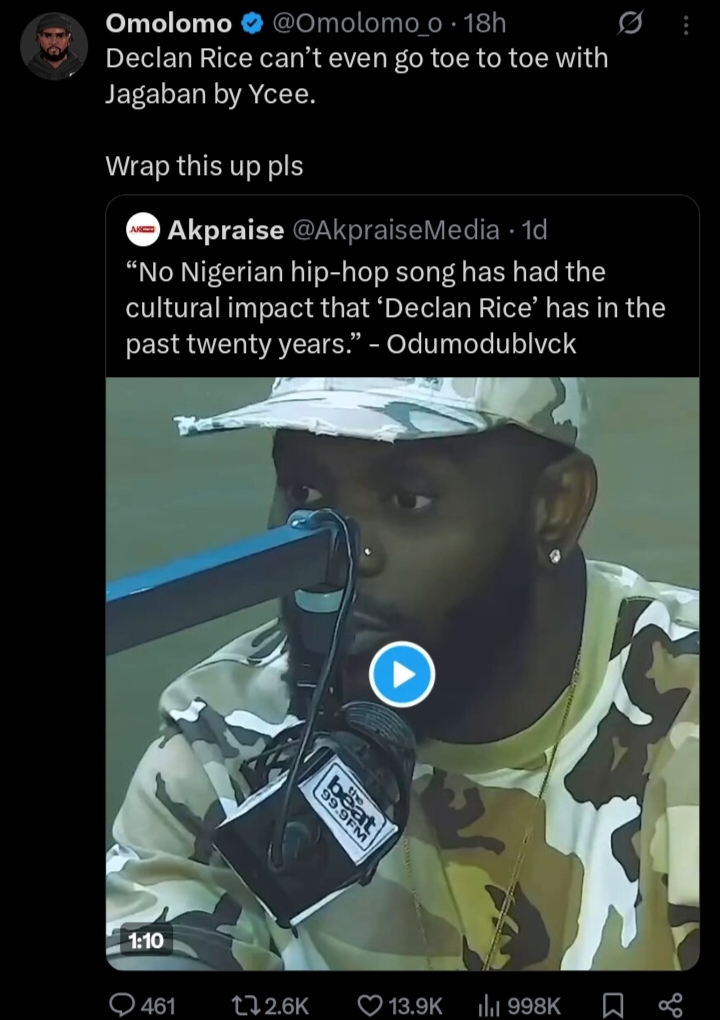
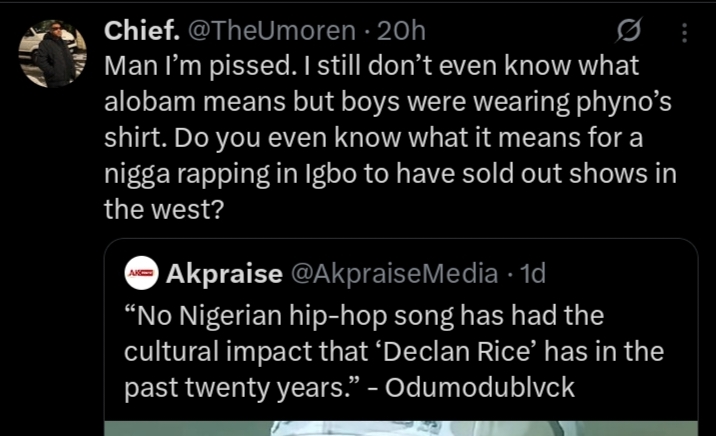
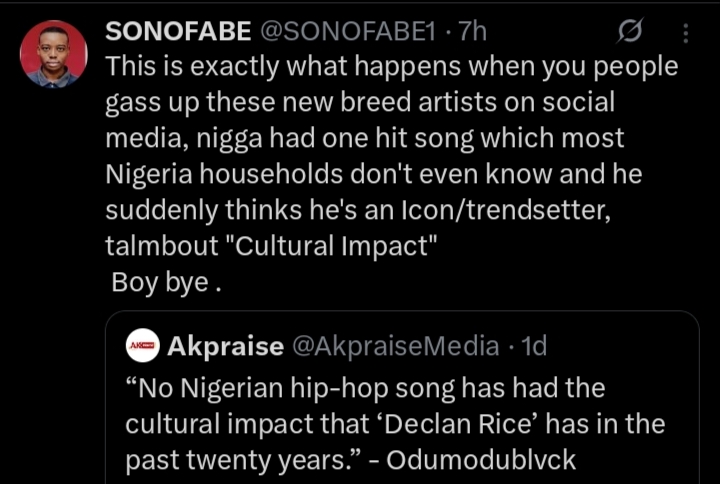

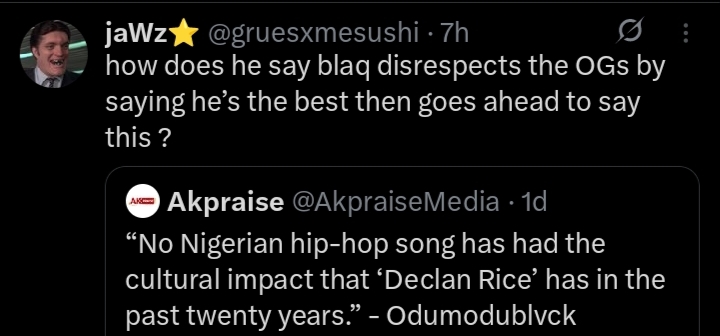
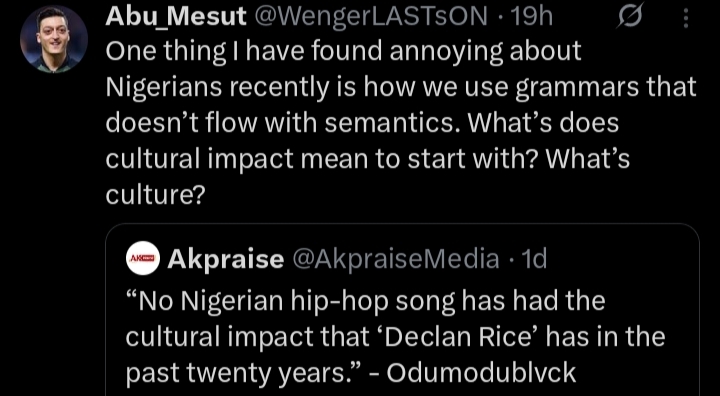
Tomisin thinks Odumodu’s controversial remark is his way of getting people to talk about him
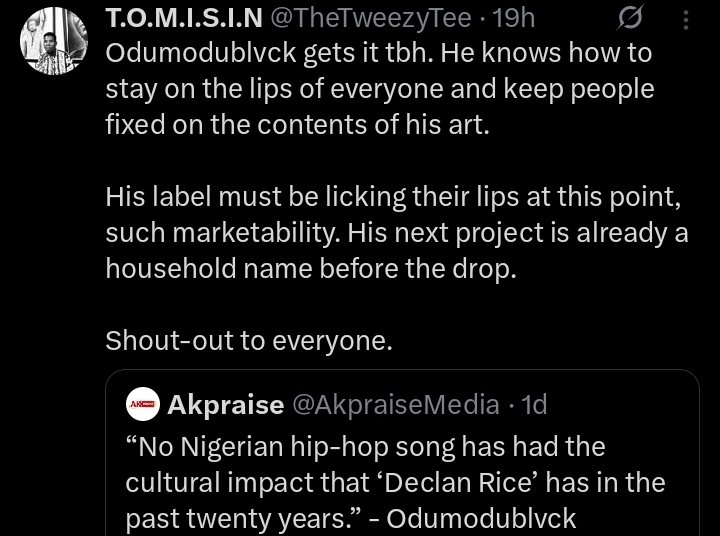 South African knocks Odumodu, say he is not known in his country but Ice Prime and Naeto C are a force to be reckoned with
South African knocks Odumodu, say he is not known in his country but Ice Prime and Naeto C are a force to be reckoned with
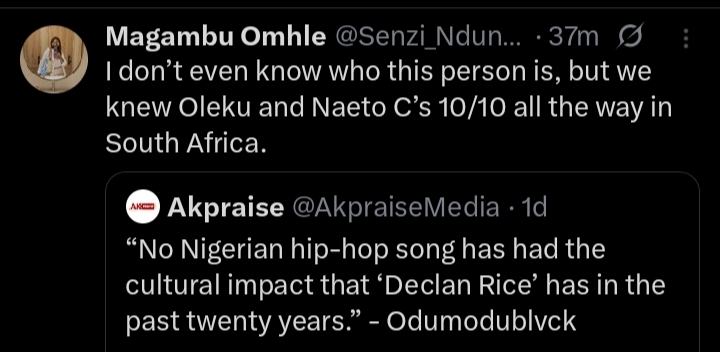

The feisty and truculent artist was unfazed by the avalanche of criticism that greeted his statement
EVERY TIME YOU SEE DECLAN RICE YOU THINK OF ME.
EVERYTIME HE SCORES,ASSIST,PLAYS.
THE STREAMS ARE SKYROCKETING
YOU DO NOT EVEN KNOW WHAT CULTURAL IMPACT IS. JUST OPEN MOUTH WAAAAA!! FOOTBALL IS BIGGER THAN EVERYTHING.
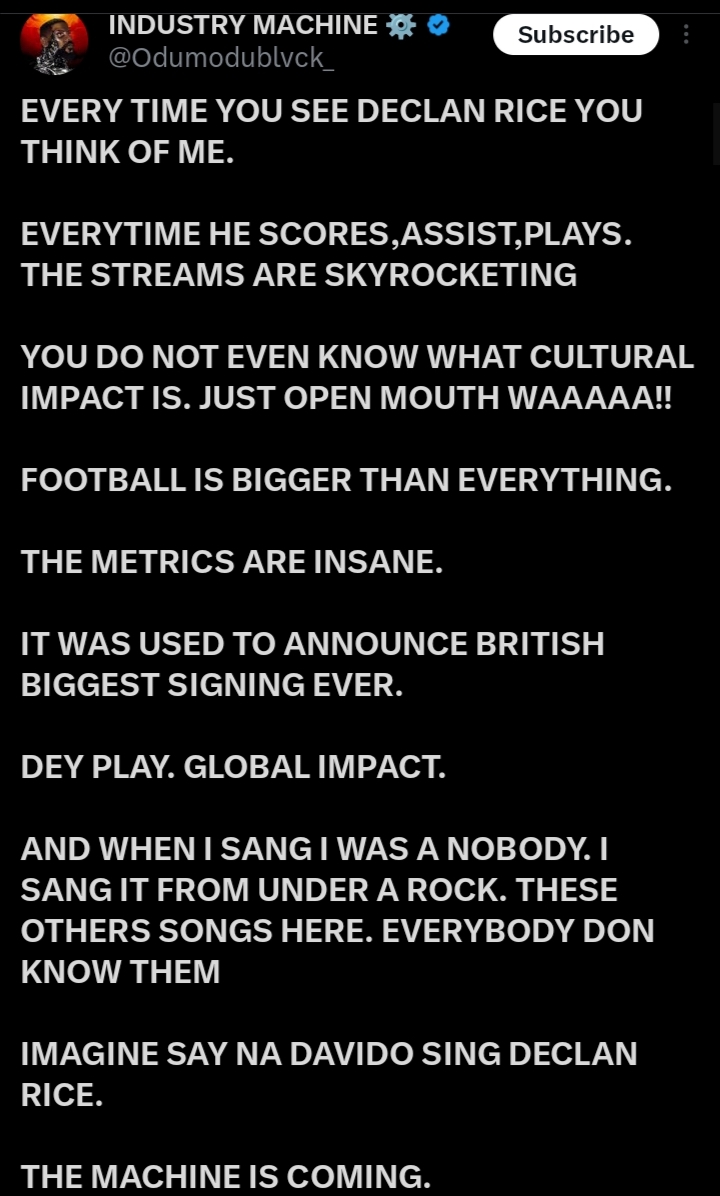
Final thoughts
Art is subjective. But what can’t be allowed is blatant distortion of fact and brazen revisionism in the name of subjectivity. When this happens, then the freedom to subjectivise art becomes open to ridicule and contempt. Especially if the character who abuses this freedom is the owner of the art that is the subject of public debate.
Odumodu is free to blow his own trumpet and thump his chest at what he has achieved in the highly competitive Nigerian music industry, but what he can’t do is belittle the work of those before him who clearly head and shoulders above him in the game.
Declan Rice is a major hit and will likely remain one, but despite his popularity, he carries little to no cultural impact, both at home and abroad.













Leave a comment